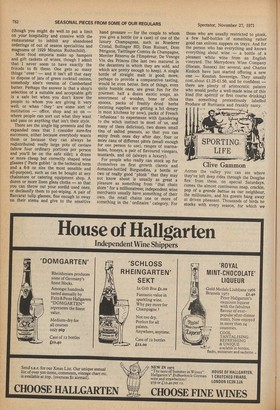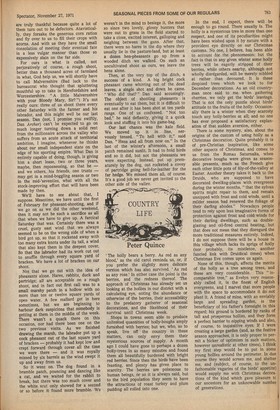Clive Gammon
Across the valley you can see where they've left deep rides through the Douglas firs: from these, on special Saturdays, comes the almost continuous snap, crackle, pop of a grande battue as our neighbour, the millionaire, and his guests bang away at driven pheasant. Thousands of birds he stocks with every season, for which we are truly thankful because quite a lot of them turn out to be defectors. Atavistically, they forsake, the generous corn ration and fly over to us to fill their crops with acorns. And with us they have the small consolation of meeting their eventual fate in a less vulgar manner than those so expensively slain on the far side.
For ours is what is called, not perjoratively of course, a rough shoot, better than a thousand acres of farmland in what, God help us, we will shortly have to call Malvernshire (Bad luck to the bureaucrat who thought that spluttering mouthful up to take in Herefordshire and Worcestershire. "A little Malvernshire with your Bloody Mary, Sir? ") It's not really ours: three of us shoot there every other Saturday with the farmer and his labrador, and this might well be our last season. Dan (not, I promise you swiftly, Dan Archer) can't be expected to go on much longer turning down a solid rent from the millionaire across the valley who suffers from an acute attack of territorial ambition, I imagine, whenever he thinks about our small independent state on the edge of his sporting empire. What Dan is entirely capable of doing, though, is giving him a short lease, two or three years, maybe, then repossessing, so that he — and we others, his friends, one trusts — may get in a mind-boggling season or two In the mid-'seventies, what with all the stock-improving effort that will have been made by then.
We'll have to see about that, I suppose. Meantime, we have until the first of February for pheasant-shooting, and if we go on as we did the other weekend, then it may not be such a sacrifice as all that when we have to give up. A farcical Saturday that was. Certainly there was a cruel, gusty east wind that we always seemed to be on the wrong side of when a bird got up, so that it rocketed away with too many extra knots under its tail, a wind that also kept them in the deepest cover, So that the labrador had its work cut out to snuffle through every square yard of bracken. We have a lot of bracken on our shoot.
Not that we go out with the idea of pheasants alone. Hares, rabbits, duck and partridge; all are acceptable on a rough shoot, and in fact out first call was to a small marshy patch in a hollow with no more than ten or twelve square yards of open water. A few mallard get in here sometimes, but we are beginning to harbour dark suspicions that somebody is getting at them in the middle of the week. There wasn't a quack there on this occasion, nor had there been one on the two previous visits. As we finished drawing the marsh, the labrador put up a cock pheasant out of the last square yard of bracken — probably it had kept low and crept forward through cover all the time we were there — and it was royally missed by six barrels as the wind swept it up and away from us.
So it went on. The dog found in a bramble patch, pouncing and dancing like a cat, and we waited for the rabbit to break, but there Was too much cover and the white scut only showed for a second or so before it found more bramble. We weren't in the mind to besiege it, the more so since two lovely, glossy hunters that were out to grass in the field started to take a close, excited interest, galloping and neighing between the guns. After that, there were no hares in the dip where they usually lie in the pasture-land, but at least a dozen hen-pheasants go up from a wooded ditch we walked. On such an uncultivated shoot as ours, we leave the hens alone.
Then, at the very top of the ditch, a success of a kind. A big bright cock pheasant came whirring out of the dead leaves, a single shot and down he came. "Who did that?" Dan said accusingly. The object of shooting pheasants is eventually to eat them, but it is difficult to eat one after it has been shot at ten yards range. One of us confessed. "Not too bad," he said defiantly, giving it a quick look and stuffing it into his game-bag.
Our last chance was the kale field. We moved up it in line, nervously tensed. "To hell with it," said Dan. "Hens and all from now on." In the last of the winter's afternoon, a small patch remained sunlit. It had to hold birds and so it did, but not the pheasants we were expecting. Instead, put up prematurely by the dog, out rocketed a covey of partridge going hell-for-leather for the far hedge. We missed them all, of course. It's a good job we never get invited to the other side of the valley.















































 Previous page
Previous page